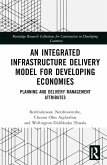Futures studies is a new field of inquiry involving systematic and explicit thinking about alternative futures. It aims to demystify the future, make possibilities for the future more known to us, and increase human control over the future. This book summarizes and expands contributions of futurists to the envisioning power and well-being of humanity. Bell brings together futurist intellectual tools, describing and explaining not only the methods, but also the nature, concepts, theories, and exemplars of the field.
Foundations of Futures Studies fulfills Bell's five main purposes for writing this two-volume effort: (1) to show that futures studies, like other fields from anthropology to zoology, exists as an identifiable sphere of intellectual activity; (2) to create a teaching instrument that can be used as a basic text for core courses in futures studies; (3) to futurize the thinking of specialists in other disciplines; (4) to contribute to the further development and improvement of futures studies; and (5) to provide tools to empower both ordinary people and leaders to act in ways that create better futures for themselves and their societies. Bell maintains that despite its sometimes doomsday rhetorical style and widespread use by special interests, futures studies offers hope for the future of humanity and concrete ways of realizing that hope in the real world of our everyday lives. It will appeal to all interested in futures studies, as well as sociologists, economists, political scientists, and historians.
Foundations of Futures Studies fulfills Bell's five main purposes for writing this two-volume effort: (1) to show that futures studies, like other fields from anthropology to zoology, exists as an identifiable sphere of intellectual activity; (2) to create a teaching instrument that can be used as a basic text for core courses in futures studies; (3) to futurize the thinking of specialists in other disciplines; (4) to contribute to the further development and improvement of futures studies; and (5) to provide tools to empower both ordinary people and leaders to act in ways that create better futures for themselves and their societies. Bell maintains that despite its sometimes doomsday rhetorical style and widespread use by special interests, futures studies offers hope for the future of humanity and concrete ways of realizing that hope in the real world of our everyday lives. It will appeal to all interested in futures studies, as well as sociologists, economists, political scientists, and historians.








